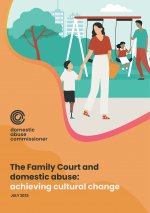
The Family Court and domestic abuse: achieving cultural change
Omschrijving
Many victims and survivors of domestic abuse who are separating from their abuser will need to go through Family Court proceedings, particularly where there is disagreement about child arrangements (known formally – and referred to in this report - as private law children proceedings, or child arrangements proceedings). In the 12 months to 31st December 2022 alone, 52,204 private law children cases were started.12 However 10 percent of these did not involve separating parents.
A small-scale study by Cafcass and Women’s Aid Federation England in 2016 suggested that allegations of domestic abuse are present in up to 62 percent of such cases, meaning that there could be up to an estimated 32,400 private law children cases involving domestic abuse every year. Whilst the figures are not precise, they indicate an issue of concern on a considerable scale. We appreciate that the role of the Family Court is much wider than simply focusing on cases involving domestic abuse; it is a busy system with multiple stakeholders who are making thousands of decisions every day.
That said, it is clear the family justice system’s response to domestic abuse is a key piece of the puzzle when considering the national response to domestic abuse as a whole, and improving the family justice system’s response to domestic abuse is a priority for the Domestic Abuse Commissioner. Her vision is for a family justice system that has a culture of safety and protection from harm, where children’s needs and the impact of domestic abuse are central considerations, and victims and survivors of domestic abuse feel listened to and respected. The failings identified by the Harm Panel undermine public trust in the courts’ ability to fairly assess allegations of domestic abuse and suggest that the risk to child and adult victims and survivors from domestic abuse perpetrators is not always properly understood or taken into account when orders are made. Consequently, unsafe contact may be ordered, putting child and adult victims and survivors at risk of harm from perpetrators, which often has damaging physical, emotional and psychological impacts with potentially lifelong consequences.15 In addition to the clear dangers to children and families of unsafe contact arrangements, the process and unsafe outcomes result in further trauma.
Some of these consequences were devastatingly illustrated in a Channel 4 Dispatches programme, which showed distressed children being removed from their mother against their will in the middle of the night, and – in a separate case - a mother having to fight for many years through the Family Court to prevent her convicted paedophile ex-husband from having contact with her children.
